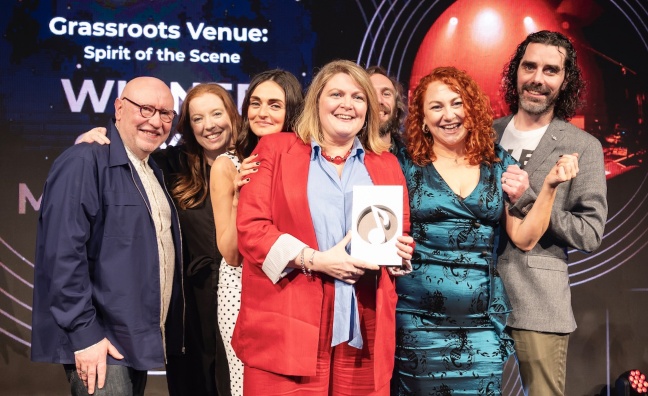Following her venue's Music Week Awards win earlier this month, Charlotte Dryden has spoken to Music Week about the harsh realities facing the grassroots circuit.
Dryden (pictured above, holding award) was speaking at last week’s sold out Music Week Awards, which took place at the JW Marriott Grosvener House London, Park Lane, W1 and featured a star turn from Girls Aloud and Strat winner Peter Loraine.
The first award given out at the event was Grassroots Venue: Spirit Of The Scene, which recognises the crucial role played by the sector. Dryden and her team from Belfast's Oh Yeah Music Centre were ecstatic upon receiving the trophy, with the result decided by a public vote.
The venue opened in 2007 and, as well as a busy gig schedule, runs a talent development programme, workshops, masterclasses and a range of other services and resources including rehearsal and recording spaces, mentoring and more.
Once Dryden and her ecstatic colleagues had finished taking selfies with their trophy, we sat down with the CEO, who painted a vivid portrait of life running a grassroots venue and appealed to the wider industry for support...
Before, it was always about the records, the artists and the big companies, but now people know that venues play a huge part in the ecosystem
Charlotte Dryden
Firstly, how does it feel to have won?
“We’re elated! We put everything into the public campaign for this. If it wasn’t for Music Venue Trust… They’ve been amazing, and small venues contribute massively to the ecosystem, so to put all the energy we have into it [and to win] shows that people who come to the venue care and the audiences care. It’s great validation for what we’re trying to do, which is to promote new music and new bands.”
How hard is your job at the moment as a small venue?
“It’s very tough. The cost of living crisis has had a huge impact on our costs and we’re trying to keep our events affordable because we want to be for the whole community. So, with ticket prices, we’re trying to keep them at an affordable level, but stock, utilities and everything else is going up and up and up and funding isn’t what it used to be, because we’re a charity too. Audiences aren’t as confident and aren’t going out as much as they used to, or at least are not booking in advance. They’re holding off until the last minute, which makes everybody a bit jumpy. So there should be more support, which is why I say, thank God for the likes of the Music Venue Trust.”
Would you like to pay tribute to the work they do?
“We’re based in Northern Ireland and we’ve been good friends of theirs for a few years. We’ve watched from the wings what they’ve done in terms of lobbying and making things happen for venues in England particularly, from getting funding from the Arts Council during Covid, to campaigning for the levy on tickets and fighting with collections and just trying to talk about how important grassroots venues are to the economy and to the whole system. That goes right to the top of the music industry, right from the audience member who pays a fiver [for a ticket], to the person who buys a record, through to the person that gets paid that big fat cheque. So they have made us matter, because it was always about the records, the artists and the big companies, but venues play a huge part in that.”
There needs to be investment in the places like ours that are developing talent with very little
Charlotte Dryden
What’s your experience of what it’s like for artists at the moment and how tough it is to tour, to get shows?
“We have a talent development programme and we know that one of the biggest challenges for artists now is touring, everything from fuel, to hotels, to venue costs, to visas… It’s really tough. That’s why small venues in towns and cities are trying to develop new artists. If we can make it affordable for them at the early part of their career and they can build up a little bit of income through gigs that they make money from… At our shows, as long as we make a few quid on the bar, they make money on tickets, we don’t charge them for merch, we let them take the door, that’s what our venue does. As long as the bar does okay then everyone can get something from it, because it is really difficult for artists.”
Do you have a message to those in the room from much bigger companies than yours?
“I would say, just back Mark Davyd and MVT. Just a small contribution from tickets, sales or streaming towards the grassroots economy, to support and help us in that development of talent coming through. The MVT did it really well with the festival line-ups and taking every band off the posters that had never played a small venue and the posters are practically empty. So there needs to be a recognition of that and investment in the places like ours that are developing talent with very little investment. We are giving them space, a platform, a professional stage, to build an audience that takes them to the next level. It’s just about recognition of that, you know?”











